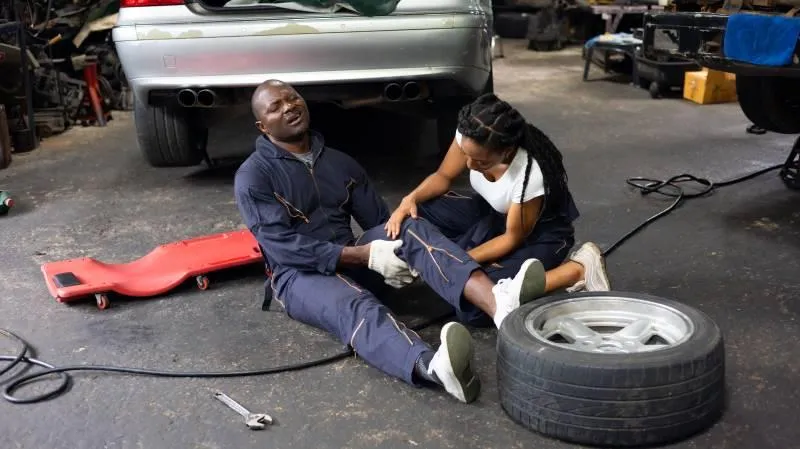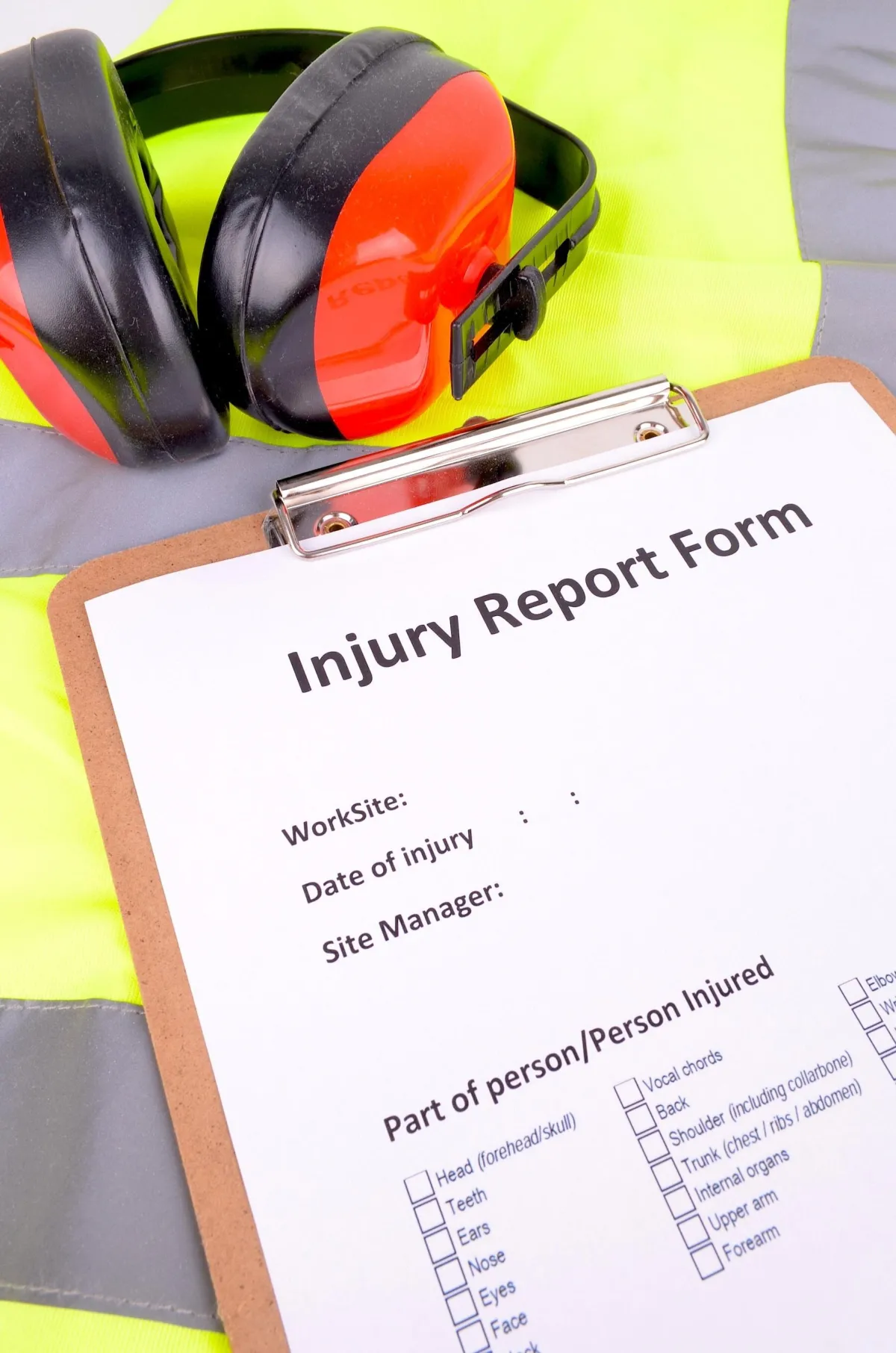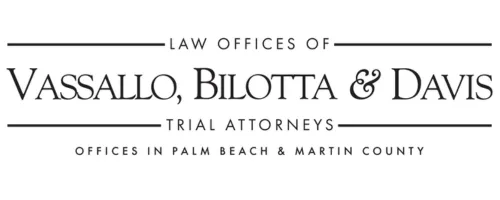PAID IF HURT AT WORK?
Do I Get Paid If I Get Hurt at Work? Understanding Paid Injury Claims for Work-Injured
Do you have questions about what happens if you get injured at work and whether you will get paid? We're here to help you navigate the tricky waters of workers' compensation and understand your rights to paid injury claims. Whether you slipped on a banana peel or had a mishap with office equipment, knowing what you're entitled to can make a world of difference. So, let's dive into how you can ensure you get the compensation you deserve. Your peace of mind and security are important, and we're here to make the process a breeze!
Key Highlights in Workers’ Compensation Injuries
* Workers’ compensation covers medical expenses and a portion of wages after a workplace injury.
* Common injuries covered include slips, falls, repetitive stress injuries, and some mental health issues.
* Report an injury within 30 days and seek medical attention to start the claim process.
* Workers’ compensation benefits typically cover two-thirds of your average weekly wage, paid bi-weekly.
* Legal assistance can help maximize your benefits and navigate complex claims processes.
Understanding Compensation When You Get Hurt at Work
Understanding what happens when you get hurt at work is crucial, especially when it comes to securing the compensation you deserve. That workplace injury doesn't just mean physical pain—it can also affect your ability to earn, making the question "Do I get paid if I get hurt at work?" incredibly important. Fortunately, injured workers have rights, and one of them is that medical care must be paid for by your employer. It's a relief to know that after a workplace accident, your medical expenses won't be an additional worry. The system is designed to ensure you're financially supported, even if you're unable to work for a while. So, how does this work in practice? Upon getting hurt at work, workers’ compensation benefits kick in to replace a portion of your wage while you recuperate. This means while you might not receive your full salary, you will still have an income to help ease any financial stress. Remember, eligibility for these benefits usually depends on the nature of your injury and ensuring all necessary steps are taken promptly. Understanding your rights and how compensation works can make all the difference. So if you find yourself asking, "Do I get paid if I get injured at work?", rest assured there’s a structured process designed to help ease your recovery journey after a workplace accident.

What Types of Injuries Are Covered?
When you're navigating the world of workers' compensation, understanding what types of injuries are covered can empower you to secure the benefits you deserve. Many typical work injury claims stem from accidents that result in physical harm, such as slips, trips, and falls, or repetitive stress injuries common in workplaces. Whether it's a back injury from lifting, a sprain from a misstep, or carpal tunnel from those long work hours at the keyboard, these can all fall under the coverage provided by workers' compensation. It's key to know that injuries don't always result from one-time accidents; repeated strain or exposure to hazardous conditions over time can also lead to a compensable injury. Additionally, accidents that cause mental health issues, like stress or depression stemming directly from a work incident, might be considered a disability covered by compensation benefits. While not all injuries are automatically deemed eligible, anything directly affecting your ability to perform job duties should be thoroughly evaluated under workplace injury policies. Remember, the specifics of each case can vary, so if you've been injured, it's crucial to report your accident promptly and seek guidance from experienced professionals. Coverage for work injuries ensures that employees don't bear the burden of workplace accidents alone, keeping you better prepared and supported when injured on the job.

Steps to Take Immediately After an Injury
Finding yourself caught in a workplace accident can both troubling and confusing. If you get hurt at work, don't panic—there are clear steps you should take to ensure you get the compensation you deserve. First, report the injury to your employer as soon as possible. It's crucial to communicate the details of the accident, as delaying your report can affect your ability to get paid. You typically have 30 days to report the incident, so don't waste any time. Second, seek medical attention immediately. Whether it's a minor bump or something more severe, visiting a doctor is a must. Not only does it safeguard your health, but it also establishes official documentation of the
injury —a vital component for your claims process. Remember, neglecting this step can result in a gap that may weaken your case. After
seeking medical attention, it's wise to follow the doctor’s advice diligently, keeping all records and bills related to your treatment. Lastly,
be informed about your rights and the necessary paperwork involved in initiating the claims process. Whether you're in Florida or elsewhere, the process can vary, so understanding the rules in your area is key. Don’t hesitate to consult with an attorney if you're uncertain about any part of the procedure. Doing all this correctly can aid in a smoother journey toward the compensation you're entitled to after being hurt at work.
Do I Get Paid If I Get Hurt at Work? How Workers’ Compensation Benefits Work
Are you curious about how workers' compensation benefits work when you get injured at work? Let's dive in! In Florida, workers’ compensation is designed to have your back when life throws you a curveball at work. So, what do you do if you're an injured worker? Once you're officially injured, you’re eligible for these benefits to help support you when you're sidelined from working. Compensation claims are your bridge to financial peace of mind while you're recovering. They help you cover lost wages and medical expenses. It’s like getting a much-needed safety net when you’re unable to work because of an injury.
Your benefits kick in pretty soon after you've reported the injury. Most injured workers see their compensation claims moving forward within days. The checks come bi-weekly, typically covering about two-thirds of your average weekly wage. Keep in mind that the exact amount you’ll receive might vary based on different factors like your employment type and time worked before the injury. But don’t sweat it! Each claim process aims to ensure you’re getting the support you need.
It's vital to report your injury promptly because delaying might hiccup the compensation benefits you’re entitled to. Understanding how these claims work can be a bit complex, but don't worry! You’re not alone. Experienced legal professionals are here, ready to guide you through every step to maximize your coverage. You got this!
Eligibility for Receiving Compensation
So, you’re navigating the aftermath of a workplace accident and wondering about your eligibility for receiving compensation. Well, you’re in the right place! The first thing an injured worker needs to determine is if the injury happened while performing work-related duties. Generally, to be eligible for benefits, your injury should've been caused by events or activities at the workplace. This eligibility can vary by state, but many adhere to similar guidelines around work injuries. Understanding your benefits is crucial. Most states, including those in Florida, have workers’ compensation systems in place to support injured workers. You’ll typically need to report the accident to your employer promptly and follow the claim procedure specific to your state. The work you’ve done leading up to the accident and the nature of your duties will play a significant role in determining eligibility. Remember, it’s not just about the physical injuries; illnesses caused by work conditions could also be claimable. Once you establish eligibility, the next step is ensuring all needed documentation is in place for your claim. It's also worth considering the advice of a legal professional to navigate the complexities and secure your rights effectively. Armed with the right knowledge, you'll be in a better position to ensure your claim is successful.
How to Begin Your Claim Process
Taking swift action is essential when you get injured at work to ensure you're on the right path to receiving compensation. Start by immediately notifying your employer about your injury. This report is crucial in triggering the claim process; it serves as the formal alert that you were injured on the job. After that, schedule a visit to the doctor. Your medical evaluation not only addresses your health needs but also provides key documentation for your claim. Remember, a visit to a doctor approved by your workplace or their insurance might be required, so check with your employer. Once these steps are completed, seeking guidance from a competent workers' compensation lawyer can be a game-changer. A lawyer will help you navigate the legal complexities and make sure all your rights are protected throughout the claim process. They’ll ensure you’re taking the correct legal steps if disputes arise. It's critical that your injured status, treatment, and recovery are thoroughly documented, as this information will be central to your compensation claim. Don’t delay in starting your claim, as there are often time limits that could affect your eligibility for certain benefits. By following these initial steps and engaging with the right legal help, you'll be well-positioned to get the compensation you deserve.
Get Paid if You Get Injured: Calculating Your Benefits
Getting injured at work can be a stressful experience, but understanding how to get paid and calculate your compensation benefits can bring some clarity. When you get injured on the job, you're often entitled to workers' compensation benefits, which are designed to help cover your expenses while you're unable to work. The amount you get paid depends on several factors, including your average weekly wage before the accident and the extent of your disability. Typically, you can expect to receive about 66 2/3 percent of your average weekly wage, offering some financial relief during your recovery period. It's crucial to accurately document your injury and report it to your employer promptly. That's because the benefits will kick in only after your workplace accident is officially recognized. Keep in mind that if your disability lasts more than 21 days, you may even get paid for the initial seven days of missed work, which is a huge relief for many injured workers. So, don't delay in starting your claim process to secure those much-needed benefits. Successfully navigating the compensation system often requires a strategic
approach, and knowing your rights can empower you. Get informed, get organized, and don’t hesitate to seek professional guidance to ensure you maximize your potential paid compensation benefits.

Understanding the Disability Benefits Structure
Getting hurt at work can be a stressful experience, but understanding the disability benefits structure for work-related injuries is crucial to ensuring you’re properly compensated. When it comes to compensation, your employer must cover your medical care, which is a significant relief. But the question remains - how does the benefits structure work? The disability benefits you receive are fundamentally aimed at helping you sustain your livelihood while you're unable to work. Typically, these benefits consist of two-thirds of your average weekly wage, which often makes a world of difference in managing household expenses during your recovery period. It’s comforting to know that your compensation isn't left to chance; there’s a structured system in place to ensure you receive the benefits you deserve. And remember, your employer's responsibility doesn’t stop there. Their obligation to pay for your medical care is a key component of this structure, ensuring that you get the necessary treatment to get you back on your feet. By knowing the ins and outs of the disability benefits framework, you empower yourself to look after your well-being and financial stability. Don't hesitate to seek guidance from experienced legal professionals who can help maximize your work injury compensation and ensure your rights to benefits are fully upheld.
Securing Your Rights After Getting Injured
When you're injured at work, it's vital to know your rights and ensure you receive the compensation you're entitled to. Securing your rights after a workplace injury can feel overwhelming, but fear not—understanding your legal options is the first step to maximizing your coverage. It's all about knowing what you're legally entitled to and how to pursue it effectively. Your injuries shouldn’t result in unpaid bills or financial stress, and that’s where understanding the claims process comes in. Whether you’re dealing with a minor workplace injury or a more serious one, having clarity on the compensation available to you will make a significant difference. Start by familiarizing yourself with your legal rights and understanding how to initiate a claim for your workplace injuries. This knowledge will guide you through the process, ensuring you take the correct steps to secure your compensation. Remember, reaching out to experienced legal professionals can be a game-changer, offering the guidance needed to navigate the complexities of your claim. They’ll ensure you’re not just left in the dark about your rights or the coverage you deserve. So, embrace your rights, pursue your claim diligently, and rest assured there are paths available to help you get back on track after getting injured at work.
The Role of Legal Assistance in Maximizing Coverage
Getting injured at work is tough, but understanding how to maximize your benefits with the right legal assistance can make all the difference. That's where a dedicated lawyer from a reputable firm comes in handy. They know the ins and outs of workers' compensation and are skilled at navigating the system to ensure you get the maximum coverage possible. A lawyer helps to ensure that all your medical expenses, like doctor visits and treatment, are fully covered, so you can focus on recovery without the stress of mounting bills. They’ll make sure your injury is properly documented and establish that it happened in the course of your duties to boost your claim's validity. Legal assistance also plays a crucial role in negotiating better compensation for lost wages. The firm you choose understands the significance of every penny in these trying times and is committed to advocating for the benefits you rightfully deserve. With a lawyer by your side, you're not just a case file; you’re a person who needs support. They’ll work hard to ensure that you receive fair compensation and that no stone is left unturned in your pursuit of securing what’s rightfully yours. Remember, having legal support isn't just about claiming benefits; it’s about securing peace of mind while you heal and move forward.
Hurt at Work FAQ
Q: What should I do immediately after getting injured at work?
A: First, report the injury to your employer as soon as possible—ideally within 30 days, as this is crucial for starting the claims process. Then, seek medical
attention right away to ensure your health is prioritized and establish official documentation of the injury, which is vital for your claim.
Q: What types of injuries are typically covered by workers' compensation?
A: Common injuries covered include slips, falls, repetitive stress injuries, and some mental health issues arising from workplace incidents. Whether it's a
back injury, a sprain, or carpal tunnel syndrome, these injuries can usually be claimed under workers' compensation.
Q: How much of my wage is covered by workers' compensation if I'm unable to work due to injury?
A: Workers' compensation benefits typically cover about two-thirds of your average weekly wage. These benefits are paid bi-weekly, offering some financial relief while you recover.
Q: How do I maximize my benefits after a workplace injury?
A: To maximize your benefits, it's advisable to consult with a legal professional who can help navigate the claims process and ensure all aspects of
your injury and treatment are documented correctly. They can also assist in negotiating better compensation for lost wages.
Q: What should I do if my injury leads to both physical and mental health issues?
A: If your injury leads to mental health issues such as stress or depression, report these as part of your claim. Your mental health concerns are important,
and may be eligible for coverage under workers' compensation if directly linked to your workplace incident.
Navigating the aftermath of a workplace injury can seem daunting, but remember, taking these steps can help ensure you receive the compensation you deserve. Don't hesitate to reach out to a legal professional for guidance—they're there to help you every step of the way!
Conclusion
Getting hurt at work can be overwhelming, but remember, you're not alone. Our team at Vassallo, Bilotta, and Davis is here to help you navigate through the complexities of workplace injury claims. We understand the ins and outs of workers' compensation in West Palm Beach and are dedicated to ensuring you receive the benefits you deserve. Don't hesitate to reach out and let our experienced workplace injury attorneys guide you. Your rights and well-being are our top priority, and we're ready to stand by your side every step of the way. Let's get you the compensation you deserve!
